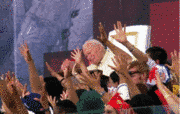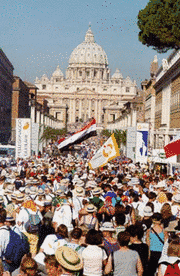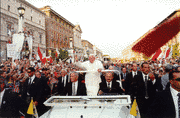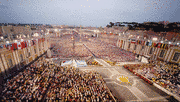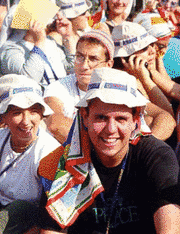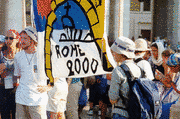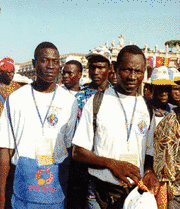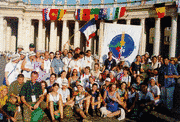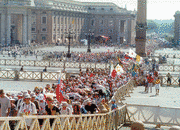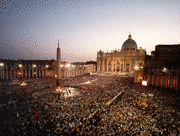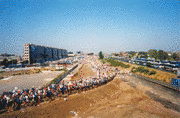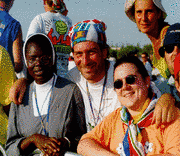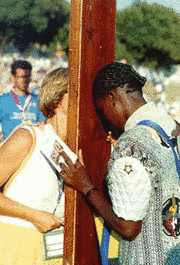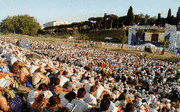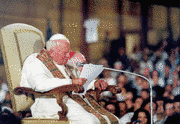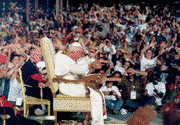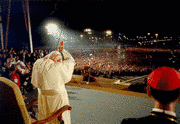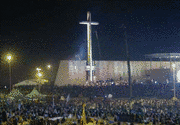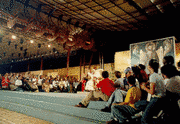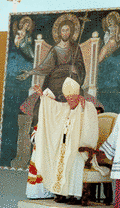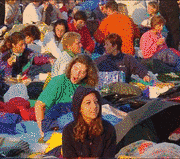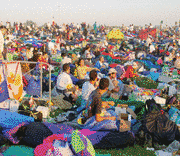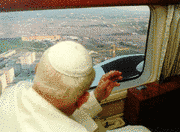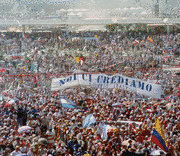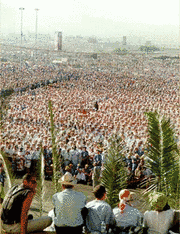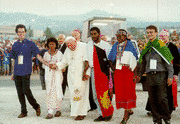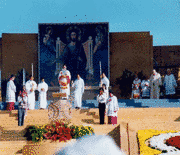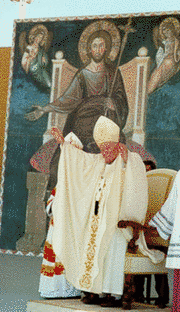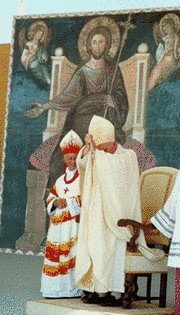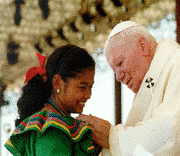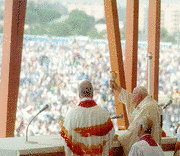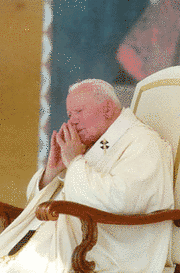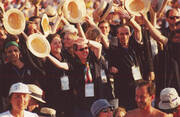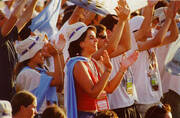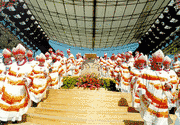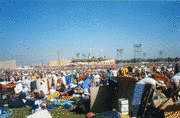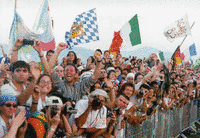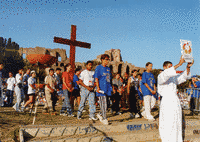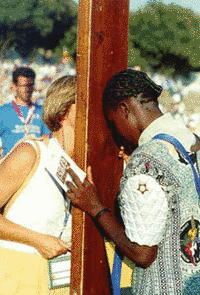
World Youth Day 2000 Rome
XV Giornata Mondiale della Gioventù - in Italy
7th international WYD / GMG - Roma, 15-20 August Jubilee 2000
"The Word became flesh and dwelt among us"
Theme for 15th WYD/JMJ (cf Jn 1: 14) & JPII's Message to Young People
WYD in the Holy Jubilee 2000 began on the Feast of the Assumption, with Pope St John Paul II welcoming young pilgrims from Rome and Italy in St John Lateran Basilica and then pilgrims from all around the world in St Peter's Square. On Thursday, JPII celebrated Mass at Castel Gondolfo with young people from the 7th International Forum. On Saturday young pilgrims treked to Tor Vergata for the WYD prayer vigil with the Holy Father, where they camped overnight ahead of the final Holy Mass for the 15th World Youth Day at the end of which JPII recited the Angelus. There were some 2.5 million young people at Tor Vergata, making it the largest gathering in the history of Europe.
Peter from England ![]()
"It was a huge experience just to like ‘right, I’m a Catholic. I am part of something, even though I’m just young.’ And there we were, it was amazing, however millions and John Paul II … "
Caecilia, from Germany ![]()
"I learned to love the Church so much at WYD in 2000. I learned to see the fullness from the Church and the joy from the Church .. I understood Jesus is really present in the Eucharist."
Papa San Giovanni Paolo's welcome in St John Lateran Basilica
Tuesday 15th August 2000, Feast of the Assumption - in English, French, German, Italian, Portuguese & Spanish
1. O Roma felix!" "O happy Rome!"
With this exclamation, countless throngs of pilgrims before you, dear young people who are gathered for the 15th World Youth Day, traveled down the centuries to the city of Rome to kneel at the tombs of the Apostles Peter and Paul.
"O happy Rome!" Happy because it was consecrated by the witness and blood of the Apostles Peter and Paul who still today, like two "verdant olive trees" and two "lamps lit", together with all the other saints and martyrs, show us the One whom we are here to celebrate: the Word who "become flesh and dwelt among us" (Jn 1, 14), Jesus Christ, the Son of God, the living testimony of the Father's eternal love for us.
"O happy Rome!", happy too because today this testimony which you preserve is alive and is offered to the world, in particular to the world of the young generations!
2. I greet you all affectionately, young people who belong to the diocese of Rome and to the Church in Italy. I greet Cardinal Camillo Ruini, Vicar of Rome and President of the Italian Episcopal Conference, and am grateful to him for his words to me. I also thank the two young Romans who have greeted me on behalf of you all.
I am pleased to see so many of you and I congratulate all those who have helped young men and women from other countries to take part in this exceptional meeting as well. I know how much the young people of the various Italian dioceses have done to prepare for this moment of an "exchange of happiness". In this city, which preserves the tombs and memorials of those who witnessed to the Saviour of the world, may every young person meet Jesus, the One who knows the secret of true happiness and promised it to his friends with these words: "These things I have spoken to you, that my joy may be in you, and that your joy may be full" (Jn 15, 11).
Dear friends, at this moment, so longed-for and so significant, I naturally think back to the First World Youth meeting which took place precisely here, in front of the cathedral of Rome. Today we are setting out from here to have a new experience at a global level: it is the meeting which opens a new century and a new millennium. My hope is that it will allow the hearts of all to encounter the eternally living Christ.
3. Young people, children of the Church whose bishop is the Successor of Peter and who, as St Ignatius of Antioch said, is called to "preside in charity" (Ad Romanos, Introd), be committed in these days to welcoming the other young people who have gathered here from all the regions of the world. Form heartfelt friendships with them. Make their stay here in Rome enjoyable, competing in the spirit of service and friendly welcome in the style of Jesus' friends - Lazarus, Martha and Mary - who often gave him hospitality at their house. Together with the young people from the 12 dioceses on the borders of Rome, open the doors of your homes to the pilgrims of this World Youth Day, becoming a hospitable city, a friendly home, so that here too there may be a meeting today among friends: among us all and our great Friend, Jesus!
4. Live this World Day intensely, dear young pilgrims of the third millennium. Through your contact with your many peers who, like you, want to follow Christ, treasure the words that the bishops will say to you, accepting the Lord's voice to strengthen your faith and to witness to it without fear, knowing you are heirs of a great past.
In opening your Jubilee, dear young people, I would like to repeat the words with which I began my ministry as Bishop of Rome and Pastor of the universal Church; I would like them to guide your days in Rome: "Do not be afraid! Open, indeed, open wide the doors to Christ!" Open your hearts, your lives, your doubts, your difficulties, your joys and your affections to his saving power, and let him enter your hearts. "Do not be afraid! Christ knows what is in man. He alone knows it." I said this on 22 October 1978. I repeat it with the same conviction, with the same force today, seeing the hope of the Church and of the world shining in your eyes. Yes, let Christ govern your young lives; serve him with love. To serve Christ is freedom!
5. We are opening these days under the gaze of Mary Most Holy, whom we contemplate today assumed into heaven: may the example of the young Virgin of Nazareth help you to say "yes" to the Lord who is knocking at your door and wants to enter and make his dwelling within you."
Responding to the young people's cry, "Long live the Pope!", the Holy Father said extemporaneously:
"He is alive, the Pope has been alive for 80 years and the young people want him young for ever. How can I do it? Thank you for your catechesis. I hope that you are enjoying your stay in Rome, that you feel ever close to the Salus Populi Romani and feel her motherly closeness.
This is my last wish, because I have to go to St Peter's to welcome, in your name too, all those who have come to Rome from every part of the world to celebrate and live the Jubilee of Young People with you."
Pope St John Paul II's words at St Peter's
Welcome Ceremony, Feast of the Assumption, 15 August 2000
- in English, French, German, Italian, Polish, Portuguese & Spanish
"1. Dearest young people of the 15th World Youth Day, dear brother priests, men and women religious, and teachers who are here with you, welcome to Rome! I thank Cardinal James Francis Stafford for his warm words of presentation. With him I greet Cardinal Camillo Ruini, and the other Cardinals, Archbishops and Bishops present. I also thank the two young people who so well expressed the feelings of all of you, gathered here from so many parts of the world.
After stopping at the Basilica of St John Lateran, the Cathedral of Rome, to greet the young people of Rome and Italy, I welcome all of you with joy. The Roman and Italian young people join me in offering you a most fraternal and heartfelt welcome.
Your faces bring to mind, and in a way make present here, all the young people that it has been my privilege to meet on my apostolic journeys throughout the world in these years at the end of the millennium. To each of you I say: Peace be with you!
Peace be with you, young people who have come from Africa: d'Algérie, de Angola, du Bénin, du Burkina Faso, du Burundi, du Cameroun, de Cabo Verde, du Tchad, du Congo, de Côte d'Ivoire, d'Egypte, from Eritrea, du Gabon, from Gambia, from Ghana, de la République de Guinée, de Gibuti, da Guiné Bissau, from Kenya, des Comores, de l'Ile Maurice, from Lesotho, from Liberia, de Libye, de Madagascar, from Malawi, du Mali, du Maroc, de Moçambique, from Namibia, from Nigeria, de la République Centreafricaine, de la République Démocratique du Congo, du Rwanda, du Sénégal, from the Seychelles, from Sierra Leone, from South Africa, from Sudan, from Swaziland, from Tanzania, du Togo, from Uganda, from Zambia, from Zimbabwe.....
Peace be with you, young people who have come from the Americas: from the Antilles, de Argentina, from the Bahamas, from Belize, de Bolivia, do Brasil, from Canada, de Chile, de Colombia, de Costa Rica, de Cuba, del Ecuador, de El Salvador, de Guatemala, d'Haiti, de Honduras, de México, de Nicaragua, de Panama, del Paraguay, de Perú, de Puerto Rico, de la República Dominicana, from Saint Lucia, from Saint Vincent and the Grenadines, from the United States of America, from Suriname, del Uruguay, de Venezuela. ...
Peace be with you, young people who have come from Asia: from Saudi Arabia, from Armenia, from Bahrein, from Bangladesh, du Cambodge, from South Korea, from the United Arabs Emirates, from the Philippines, from Georgia, from Japan, from Jordan, from Hong Kong, from India, from Indonesia, de l'Iraq, from Israel, from Kazakhstan, from Kyrgyzstan, du Laos, du Liban, from Malaysia, from Mongolia, from Myanmar, from Nepal, from Oman, from Pakistan, from Qatar, from Singapore, de Syrie, from Sri Lanka, from Taiwan, from the Palestinian Territories, from Thailand, de Macau, de Timor Leste, from Turkmenistan, from Uzbekistan et du Viet Nam....
Peace be with you, young people who have come from Europe: dall'Albania, aus Österreich, de Belgique, de Biélorussie, from Bosnia-Hercegovina, from Bulgaria, from Cyprus, dalla Croazia, from Denmark, aus Deutschland, from England, de España, from Estonia, from Finland, de France, from Greece, from Ireland, dall'Italia, from Latvia, aus Lichtenstein, from Lithuania, du Luxembourg, dalla Macedonia, from Malta, from Moldova, from the Netherlands, from Norway, z Polski, de Portugal, de la Principauté de Monaco, dalla Repubblica Ceca, dalla Repubblica di San Marino, dalla Romania, dalla Russia, from Scotland, dalla Slovacchia, dalla Slovenia, de Suisse, from Sweden, from Turkey, from Ukraine, from Hungary, from Yugoslavia.....
Peace be with you, young people who have come from Oceania: from Australia, from Guam, from New Zealand, from Papua New Guinea.....
With special affection I greet the group of young people from countries where hatred, violence and war bring suffering to the life of entire populations. Thanks to the solidarity shown by all the youth here present, they have been able to come here this evening. To them I say, in your name as well, that in our gathering we are close to them as brothers and sisters; with all of you, I ask for them and for their people a time of peace in justice and freedom.
I mention too the young people of other Churches and ecclesial communities who are here this evening with some of their pastors: may the World Youth Day be another occasion for us to know each other and to implore together from the Spirit of the Lord the gift of the perfect unity of all Christians!
Dear friends from the five continents, I am happy to inaugurate with you this evening the Jubilee of Young People. Pilgrims in the footsteps of the Apostles, imitate their faith.
Jesus Christ is the same yesterday, today, and forever!
* * * * *
1. Dear friends who have travelled so many miles in so many ways to come to Rome, to the Tombs of the Apostles, let me begin by putting to you a question: what have you come here to find? You have come to celebrate your Jubilee: the Jubilee of the young Church. Yours is not just any journey: if you have set out on pilgrimage it is not just for the sake of recreation or an interest in culture. Well then, let me ask again: what have you come in search of? Or rather, who have you come here to find?
There can be only one answer to that: you have come in search of Jesus Christ! But Jesus Christ has first gone in search of you. To celebrate the Jubilee can have no other meaning than that of celebrating and meeting Jesus Christ, the Word who took flesh and came to dwell among us.
The Prologue of St John’s Gospel, which has just now been proclaimed, are in a sense Jesus’s “visiting card”. These words invite us to fix our eyes on the mystery that He is. These words hold a special message for you, dear young people: “In the beginning was the Word, and the Word was with God and the Word was God. He was in the beginning with God” (Jn 1, 1-2).
Indicating to us the Word who is one in being with the Father, the eternal Word generated as God from God and light from light, the Evangelist takes us to the heart of the divine life, but also to the wellspring of the world. This Word in fact is the beginning of all creation: “all things were made through him, and without him was not made anything that was made” (Jn 1, 3). The whole created world, before ever it came to be, was in the mind of God and was willed by Him in an eternal plan of love. Therefore, if we look at the world in depth, allowing ourselves to marvel at the wisdom and beauty which God has poured out upon it, we can see in it a reflection of the Word, which biblical revelation unveils for us fully in the face of Jesus of Nazareth. In a sense, creation is the first “revelation” of him.
2. The Prologue continues with these words: “In him was life, and the life was the light of men. The light shines in the darkness, but the darkness did not accept it” (Jn 1, 4-5). For the Evangelist, the light is life, and death, the enemy of life, is darkness. Through the Word, all life appeared on the earth, and in the Word this life has its perfect fulfilment.
Identifying light and life, John is thinking of the life that is not just the biological life of the body but the life which comes from sharing in the very life of Christ. The Evangelist says: “The true light that enlightens every man was coming into the world” (Jn 1, 9). This enlightenment was given to humanity on the night of Bethlehem, when the eternal Word of the Father took a body from the Virgin Mary, became man and was born into the world. From that time onwards, every person who by faith shares in the mystery of that event experiences some measure of that enlightenment.
Christ himself, announcing that He was the light of the world, said one day: “While you have the light, believe in the light, that you may become children of light” (Jn 12, 36). This is a summons which the followers of Christ pass on to one another from generation to generation, trying to answer it in everyday life. Referring to this summons, St Paul writes: “Walk always as children of light, for the fruit of light is found in all that is good and right and true” (Eph 5, 8-9).
3. The heart of John’s Prologue is the proclamation that “the Word was made flesh and dwelt amongst us” (Jn 1, 14). A little before this, the Evangelist had declared: “He came to his own home, and his own people received him not. But to all who received him, He gave power to become children of God” (cf Jn 1, 10-12). Dear friends, are you among those who have accepted Christ? Your presence here is already an answer to that question. You have come to Rome, in this Jubilee of the 2000th anniversary of Christ’s birth, in order to open your hearts to the power of life which is in him. You have come here to rediscover the truth about creation and to recover a sense of wonder at the beauty and the richness of the created world. You have come to renew within yourselves the awareness of the dignity of man, created in the image and likeness of God.
“We have beheld his glory, glory as of the only Son from the Father, full of grace and truth” (Jn 1, 14). A contemporary philosopher has emphasized the significance of death in human life, to the point of describing man as “a being made for death”. The Gospel, on the contrary, makes it clear that man is a being made for life. Every person is called by God to share in the divine life. Man is a being called to glory.
These days, which you will spend together in Rome at the World Youth Day, should help each of you to see more clearly the glory which belongs to the Son of God and to which we have been called in him by the Father. For this to happen, your faith in Christ must grow and be strengthened.
4. I wish to bear witness to this faith here before all of you, young friends, at the tomb of the Apostle Peter, to whom the Lord wished me to succeed as Bishop of Rome. Beginning with myself, today I wish to tell you that I believe firmly in Jesus Christ our Lord. Yes, I believe, and I make my own the words of the Apostle Paul: “The life I now live in the flesh I live by faith in the Son of God, who loved me and gave himself for me” (Gal 2, 20).
I remember how as a child, in my own family, I learned to pray and trust in God. I remember the life in the parish that I attended in Wadowice, as well as the parish of St Stanislaus Kostka, in Debniki in Kraków, where I received my basic formation in Christian living. I cannot forget the experience of the war and the years of work in a factory. My priestly vocation came to its full maturity during the Second World War, during the occupation of Poland. The tragedy of the War gave a particular colouring to the gradual maturing of my vocation in life. In these circumstances, I perceived a light shining ever more brightly within me: the Lord wanted me to be a priest! I remember with feeling that moment in my life when, on the morning of 1 November 1946, I was ordained a priest.
My Credo continues in my present service to the Church. On 16 October 1978, after my election to the See of Peter, when I was asked “Do you accept?”, I answered “With obedience in faith to Christ, my Lord, and trusting in the Mother of Christ and of the Church, no matter what the difficulties, I accept” (Redemptor Hominis, 2). From that time on, I have tried to carry out my mission, drawing light and strength every day from the faith that binds me to Christ.
But my faith, like that of Peter and like the faith of each one of you, is not just my doing, my attachment to the truth of Christ and the Church. It is essentially and primarily the work of the Holy Spirit, a gift of his grace. The Lord gives his Spirit to me as He gives him to you, to help us say: “I believe”, and then to use us to bear witness to him in every corner of the world.
5. Dear friends, why do I want to offer you this personal testimony at the beginning of your Jubilee? I do so in order to make it clear that the journey of faith is part of everything that happens in our lives. God is at work in the concrete and personal situations of each one of us: through them, sometimes in truly mysterious ways, the Word “made flesh”, who came to live among us, makes himself present to us.
Dear young people, do not let the time that the Lord gives you go by as though everything happened by chance. St John has told us that everything has been made in Christ. Therefore, believe unshakeably in him. He directs the history of individuals as well as the history of humanity. Certainly Christ respects our freedom, but in all the joyful or bitter circumstances of life He never stops asking us to believe in him, in his word, in the reality of the Church, in eternal life!
Don’t ever think then that you are unknown to him, as if you were just a number in an anonymous crowd. Each one of you is precious to Christ, He knows you personally, He loves you tenderly, even when you are not aware of it.
6. Dear friends, who face the third millennium with all the ardour of your youth, give your full attention to the opportunity offered to you by World Youth Day in this Church of Rome, which today more than ever is your Church. Let yourselves be moulded by the Holy Spirit. Spend time in prayer, letting the Spirit speak to your hearts. To pray means to give some of your time to Christ, to entrust yourselves to him, to listen in silence to his word, to make it echo in your hearts.
Treat these days as though they were a great week of spiritual exercises; look for times of silence, prayer and recollection. Ask the Holy Spirit to enlighten your minds, ask him for the gift of a living faith which will forever give meaning to your lives, joining them to Christ, the Word made flesh.
May the Blessed Virgin Mary, who gave birth to Christ by the work of the Holy Spirit, Mary Salus Populi Romani and Mother of all peoples, and Saints Peter and Paul, and all the other Saints and Martyrs of this Church and of all the Churches to which you belong, sustain you on your journey."
Papa San Juan Pablo II's homily at Mass at Castel Gandolfo
with Young People at the 7th International Forum, Castel GThursday 17th August 2000 - in English, French, German, Italian, Portuguese & Spanish
"1. "Before I formed you in the womb I knew you, and before you were born I consecrated you" (Jer 1, 5). The words God addressed to the prophet Jeremiah affect us personally. They remind us of God's plan for each of us. He knows us individually because He has chosen and loved us from eternity, entrusting to each of us a specific vocation within the general plan of salvation.
Dear young people of the International Forum, I am pleased to welcome you together with Cardinal James Francis Stafford, President of the Pontifical Council for the Laity, and his staff. I greet you affectionately.
Quite rightly you feel personally challenged by the prophet's words. Indeed, many of you already hold a position of responsibility in your local Church and many others will be called to assume one.
It is therefore important that you bring with you the rich human, spiritual and ecclesial experience of this forum. You are sent out to proclaim to others the words of life you have received: they will act and take root in you the more you share them with others.
Dear young people, do not doubt God's love for you! He has reserved for you a place in his heart and a mission in the world. The first reaction can be fear or doubt. These are sentiments which Jeremiah felt before you: "Ah, Lord God! Behold, I do not know how to speak, for I am only a youth" (Jer 1, 6). The task seems immense, because it assumes the dimensions of society and the world. But do not forget that when the Lord calls, He also provides the necessary strength and grace to answer his call.
Do not be afraid to accept your responsibilities: the Church needs you, she needs your commitment and generosity; the Pope needs you and, at the beginning of this new millennium, he is asking you to take the Gospel on the paths of the world.
2. In the responsorial psalm, we heard a question which echoes with special timeliness in today's polluted world: "How can a young man keep his way pure?" (Ps 118, 9). We also heard the simple, incisive reply: "By guarding it according to your word". Thus it is necessary to ask to acquire a taste for the Word of God and for the joy to be able to witness to something that is greater than us: "In the way of your testimonies I delight..." (Ps 119, 14).
Joy is also born of the knowledge that countless other people in the world accept, like us, the "Lord's commandments" and make them the substance of their lives. How rich is the Church's universality, her "catholicity"! What diversity according to the countries, rites, spirituality, associations, movements and communities, what beauty, and at the same what deep communion in the common values and shared attachment to Jesus, the Lord!
Living and praying together, you have perceived that the diversity of your ways of receiving and expressing the faith neither alienates you from one another nor makes you rivals. It simply highlights the riches of that one, extraordinary gift of Revelation, for which the world has so great a need.
3. In the Gospel we have just heard, the Risen One asks Peter the question that will determine his whole life: "Simon, son of John, do you love me?" (Jn 21, 16). Jesus does not ask him what his talents, gifts and skills are. Nor does He ask the one who had just denied him whether from now on he will be faithful to him, whether he will stand firm. He asks him the only thing that matters, the one thing that can give a vocation its foundation: do you love me?
Today Christ is asking each of you the same question: do you love me? He is not asking you whether you know how to speak to crowds, whether you can direct an organization or manage an estate. He is asking you to love him. All the rest will ensue. In fact, walking in Jesus' footsteps is not immediately expressed in things to do or say, but first of all in loving him, in staying with him, in totally accepting him into one's life.
Today you are giving Jesus' question a sincere answer. Some will be able to say with Peter: "Lord; you know that I love you!" (Jn 21, 16). Others will say: "Lord, you know how I would like to love you; teach me to love you, to be able to follow you". The important thing is to stay on the path, to continue the journey without losing sight of the goal, until the day when you will be able to say with all your heart: "You know that I love you!"
4. Dear young people, love Christ and love the Church! Love Christ as He loves you. Love the Church as Christ loves her.
Do not forget that true love sets no conditions; it does not calculate or complain but simply loves. How could you in fact be responsible for an inheritance which you only partly accepted? How can one share in building something that one does not love with all one's heart?
May communion in the Body and Blood of the Lord help everyone grow in love for Jesus and for his Body, which is the Church."
Papa St JPII's dialogue with the Young People
at the Prayer Vigil at Tor Vergata on Saturday 19th August 2000
- in English, French, German, Italian, Polish, Portuguese & Spanish
1. “But who do you say that I am?” (Mt 16, 15).
Dear young people, it is with great joy that I meet you again at this prayer vigil, during which we wish to listen together to Christ whom we feel present among us. It is He who is speaking to us.
“Who do you say that I am?” Jesus asks his disciples this question near Caesarea Philippi. Simon Peter answers: “You are the Christ, the Son of the living God” (Mt 16, 16). The Master then turns to him with the surprising words: “Blessed are you, Simon, son of Jonah! For flesh and blood has not revealed this to you, but my Father who is in heaven” (Mt 16, 17).
What is the meaning of this dialogue? Why does Jesus want to know what people think about him? Why does He want to know what his disciples think about him?
Jesus wants his disciples to become aware of what is hidden in their own minds and hearts and to give voice to their conviction. At the same time, however, he knows that the judgment they will express will not be theirs alone, because it will reveal what God has poured into their hearts by the grace of faith.
This event which took place near Caesarea Philippi leads us, in a sense, into the “school of faith”. There the mystery of the origin and development of our faith is disclosed. First there is the grace of revelation: an intimate, ineffable self-giving of God to man. There then follows the call to respond. Finally there comes the human response, a response which from that point on must give meaning and shape to one’s entire life.
This is what faith is all about! It is the response of rational and free man to the word of the living God. The questions that Jesus asks, the answers given by the Apostles, and finally by Simon Peter, are a kind of examination on the maturity of the faith of those who are closest to Christ.
2. The conversation near Caesarea Philippi took place during the time leading up to the Passover, that is before Christ’s passion and resurrection. We should also recall another event, when the Risen Christ checked the maturity of faith of his Apostles. This is the meeting with the Apostle Thomas. He was the only one not there when, after the resurrection, Christ came for the first time into the Upper Room. When the other disciples told him that they had seen the Lord, he would not believe it. He said: “Unless I see in his hands the print of the nails, and place my finger in the mark of the nails, and place my hand in his side, I will not believe” (Jn 20, 25). A week later, the disciples were gathered together again and Thomas was with them. Jesus came through the closed door, and greeted the Apostles with the words: “Peace be with you” (Jn 20, 26), and immediately he turned to Thomas: “Put your finger here, and see my hands; and put out your hand, and place it in my side; do not be faithless, but believing” (Jn 20, 27). Thomas then answered: “My Lord and my God!” (Jn 20, 28).
The Upper Room in Jerusalem too was a kind of “school of faith” for the Apostles. However, in a sense, what happened to Thomas goes beyond what occurred near Caesarea Philippi. In the Upper Room we see a more radical dialectic of faith and unbelief, and, at the same time, an even deeper confession of the truth about Christ. It was certainly not easy to believe that the One who had been placed in the tomb three days earlier was alive again.
The divine Master had often announced that He would rise from the dead, and in many ways He had shown that He was the Lord of life. Yet the experience of his death was so overwhelming that people needed to meet him directly in order to believe in his resurrection: the Apostles in the Upper Room, the disciples on the road to Emmaus, the holy women beside the tomb ... Thomas too needed it. But when his unbelief was directly confronted by the presence of Christ, the doubting Apostle spoke the words which express the deepest core of faith: if this is the case, if you are truly living despite having been killed, this means that you are “my Lord and my God”.
In what happened to Thomas, the “school of faith” is enriched with a new element. Divine revelation, Jesus’s question and man’s response end in the disciple’s personal encounter with the living Christ, with the Risen One. This encounter is the beginning of a new relationship between each one of us and Christ, a relationship in which each of us comes to the vital realization that Christ is Lord and God; not only the Lord and God of the world and of humanity, but the Lord and God of this my concrete human existence. One day St Paul would write: “The word is near you, on your lips and in your heart: that is, the word of faith which we preach. Because if you confess with your lips that Jesus is Lord and believe in your heart that God raised him from the dead, you will be saved” (Rom 10, 8-9).
3. The readings of today’s liturgy describe the elements of the “school of faith” from which the Apostles emerged as people fully aware of the truth which God had revealed in Jesus Christ, the truth which would shape their personal lives and the life of the Church throughout history. This gathering in Rome, dear young people, is also a kind of “school of faith” for you, the disciples of today; it is the “school of faith” for all who proclaim Christ at the beginning of the third millennium.
You can all sense in yourselves the process of questions and answers that we have just been talking about. You can all measure the difficulties you have in believing, and even feel the temptation not to believe. But at the same time you can also experience a slowly maturing sense and conviction of your commitment in faith. In fact, there is always a meeting between God and man in this wonderful school of the human spirit, the school of faith. The Risen Christ always enters the Upper Room of our life and allows each of us to experience his presence and to declare: You, O Christ, you are “my Lord and my God”.
Christ said to Thomas: “Because you have seen me, you have believed: blessed are those who have not seen and yet believe” (Jn 20, 29). There is something of the Apostle Thomas in every human being. Each one is tempted by unbelief and each one asks the basic questions: Is it true that God exists? Is it true that He created the world? Is it true that the Son of God became man, died and rose from the dead? The answer comes as the person experiences God’s presence. We have to open our eyes and our heart to the light of the Holy Spirit. Then the open wounds of the Risen Christ will speak to each of us: “Because you have seen me, you have believed: blessed are those who have not seen and yet believe”.
4. Dear friends, to believe in Jesus today, to follow Jesus as Peter, Thomas, and the first Apostles and witnesses did, demands of us, just as it did in the past, that we take a stand for him, almost to the point at times of a new martyrdom: the martyrdom of those who, today as yesterday, are called to go against the tide in order to follow the divine Master, to follow “the Lamb wherever he goes” (Rev 14:4). It is not by chance, dear young people, that I wanted the witnesses to the faith in the 20th century to be remembered at the Colosseum during this Holy Year.
Perhaps you will not have to shed your blood, but you will certainly be asked to be faithful to Christ! A faithfulness to be lived in the circumstances of everyday life: I am thinking of how difficult it is in today’s world for engaged couples to be faithful to purity before marriage. I think of how the mutual fidelity of young married couples is put to the test. I think of friendships and how easily the temptation to be disloyal creeps in.
I think also of how those who have chosen the path of special consecration have to struggle to persevere in their dedication to God and to their brothers and sisters. I think of those who want to live a life of solidarity and love in a world where the only things that seem to matter are the logic of profit and one’s personal or group interest.
I think too of those who work for peace and who see new outbreaks of war erupt and grow worse in different parts of the world; I think of those who work for human freedom and see people still slaves of themselves and of one another. I think of those who work to ensure love and respect for human life and who see life so often attacked and the respect due to life so often flouted.
5. Dear young people, in such a world is it hard to believe? Is it hard to believe in the third millennium? Yes! It is hard. There is no need to hide it. It is hard, but with the help of grace it can be done, as Jesus explained to Peter: “Neither flesh nor blood has revealed this to you, but my Father who is in heaven” (Mt 16, 17).
This evening I will give you the Gospel. It is the Pope’s gift to you at this unforgettable vigil. The word which it contains is the word of Jesus. If you listen to it in silence, in prayer, seeking help in understanding what it means for your life from the wise counsel of your priests and teachers, then you will meet Christ and you will follow him, spending your lives day by day for him!
It is Jesus in fact that you seek when you dream of happiness; it is He who is waiting for you when nothing else you find satisfies you; He is the beauty to which you are so attracted; it is He who provokes you with that thirst for fullness that will not let you settle for compromise; it is He who urges you to shed the masks of a false life; it is He who reads in your hearts your most genuine choices, the choices that others try to stifle. It is Jesus who stirs in you the desire to do something great with your lives, the will to follow an ideal, the refusal to allow yourselves to be grounded down by mediocrity, the courage to commit yourselves humbly and patiently to improving yourselves and society, making the world more human and more fraternal.
Dear young people, in these noble undertakings you are not alone. With you there are your families, there are your communities, there are your priests and teachers, there are so many of you who in the depths of your hearts never weary of loving Christ and believing in him. In the struggle against sin you are not alone: so many like you are struggling and through the Lord’s grace are winning!
6. Dear friends, at the dawn of the third millennium I see in you the “morning watchmen” (cf Is 21, 11-12). In the course of the century now past young people like you were summoned to huge gatherings to learn the ways of hatred; they were sent to fight against one another. The various godless messianic systems which tried to take the place of Christian hope have shown themselves to be truly horrendous. Today you have come together to declare that in the new century you will not let yourselves be made into tools of violence and destruction; you will defend peace, paying the price in your person if need be. You will not resign yourselves to a world where other human beings die of hunger, remain illiterate and have no work. You will defend life at every moment of its development; you will strive with all your strength to make this earth ever more livable for all people.
Dear young people of the century now beginning, in saying “yes” to Christ, you say “yes” to all your noblest ideals. I pray that He will reign in your hearts and in all of humanity in the new century and the new millennium. Have no fear of entrusting yourselves to him! He will guide you, He will grant you the strength to follow him every day and in every situation.
May Mary most holy, the Virgin who said “yes” to God throughout her whole life, may Saints Peter and Paul and all the Saints who have lighted the Church’s journey down the ages, keep you always faithful to this holy resolve!
To each and every one of you I offer my blessing with affection."
Father Filip, from Belgium ![]()
"And then again this old Pope, affected by Parkinsons, said with a loud voice, 'With God and grace, it is possible." At that moment I was touched so deeply in my soul and in my heart. Never had a person touched me so much by a word. All the obstacles I had made in the years before, all the reasons I thought I had found for not becoming a priest, vanished at that moment. I understood in the deepest of that moment in my heart 'Yes, it is clear. I have to become a priest. Of course, I have to become a priest. If this old sick Pope says this with so much strength then it must be true. It is possible with God and grace.'"
Father Philip, from the UK ![]()
"John Paul II really, really inspired me at World Youth Day in Rome and I suppose in my journey to be a priest, he helped me to understand how actually priesthood isn't just something we do for God, or that we've got to sacrifice my life for the Lord, it's a gift. When I came to understand it as a gift, it transformed everything; when you realise something is a gift, you learn how to receive and this changes your whole attitude. It's not something you do for God, it's something God is doing for you; He chose us; we didn't choose Him, He chose us and we respond. John Paul II helped me to understand how it's a real mystery we're entering into and a really amazing privilege to participate in Jesus' life today and to make His life present, and to continue to receive this as a gift."
St John Paul II's homily at Mass for XV WYD
Tor Vergata on Sunday, 20th August 2000 - in English, French, German, Italian, Polish, Portuguese & Spanish
1. “Lord, to whom shall we go? You have the words of eternal life” (Jn 6, 68).
Dear young people of the 15th World Youth Day! These words of Peter, in his conversation with Christ at the end of the discourse on the “bread of life”, affect us personally. In these days we have meditated on John’s statement: “The Word was made flesh and dwelt among us” (Jn 1, 14). The evangelist has brought us back to the great mystery of the Incarnation of the Son of God, the Son given to us through Mary “when the fullness of time had come” (Gal 4, 4). In his name I greet you all once more with great affection.
2. We have reached the high point of World Youth Day. Yesterday evening, dear young people, we confirmed our faith in Jesus Christ, the Son of God whom the Father sent, as the first reading reminded us today, “to bring good tidings to the poor, ... to bind up the brokenhearted, to proclaim liberty to the captives, and the opening of the prison to those who are bound ... to comfort all who mourn” (Is 61, 1-3).
In today’s Eucharistic celebration, Jesus helps us to come to know a particular aspect of his mystery. In the Gospel, we listened to a part of his discourse in the synagogue at Capernaum after the miracle of the multiplication of the loaves. In it He reveals himself as the true bread of life, the bread which has come down from heaven to give life to the world. These are words that those who hear him do not understand. Their outlook is too material for them to grasp what Christ really means. They are thinking in terms of flesh, which “is of no avail” (Jn 6, 63). Jesus’s words, instead, have to do with the unlimited horizons of the spirit: “The words that I have spoken to you – He insists – are spirit and life.”
But his hearers are hesitant: “This is a hard saying, who can listen to it?” (Jn 6, 60). They consider themselves to be people of common sense, with their feet on the ground. For this reason they shake their heads and go away muttering, one after another. The initial crowd gradually grows smaller. At the end, only the tiny group of his most faithful disciples remains. But with regard to the “bread of life” Jesus is not prepared to back down. Rather, He is ready to lose even those closest to him: “Will you also go away?” (Jn 6, 67).
3. “Will you also?” Christ’s question cuts across the centuries and comes down to us; it challenges us personally and calls for a decision. What is our answer? Dear young people, if we are here today, it is because we identify with the Apostle Peter’s reply: “Lord, to whom shall we go? You have the words of eternal life” (Jn 6, 68).
Around you, you hear all kinds of words. But only Christ speaks words that stand the test of time and remain for all eternity. The time of life that you are living calls for decisive choices on your part: decisions about the direction of your studies, about work, about your role in society and in the Church. It is important to realize that among the many questions surfacing in your minds, the decisive ones are not about “what”. The basic question is “who”: “who” am I to go to, “who” am I to follow, “to whom” should I entrust my life?
You are thinking about love and the choices it entails, and I imagine that you agree: what is really important in life is the choice of the person who will share it with you. But be careful! Every human person has inevitable limits: even in the most successful of marriages there is always a certain amount of disappointment. So then, dear friends, does not this confirm what we heard the Apostle Peter say? Every human being finds himself sooner or later saying what he said: “To whom shall we go? You have the words of eternal life”. Only Jesus of Nazareth, the Son of God and of Mary, the eternal Word of the Father born two thousand years ago at Bethlehem in Judaea, is capable of satisfying the deepest aspirations of the human heart.
In Peter’s question: “To whom shall we go?” the answer regarding the path to follow is already given. It is the path that leads to Christ. And it is possible to meet the divine Master personally: he is in fact truly present on the altar in the reality of his Body and Blood. In the Eucharistic Sacrifice, we can enter into contact with the person of Jesus in a way that is mysterious but real, drinking at the inexhaustible fountain that is his life as the Risen Lord.
4. This is the stupendous truth, dear friends: the Word, who took flesh 2000 years ago, is present today in the Eucharist. That is why the year of the Great Jubilee, in which we are celebrating the mystery of the Incarnation, had to be an “intensely Eucharistic” year as well.
The Eucharist is the sacrament of the presence of Christ, who gives himself to us because He loves us. He loves each one of us in a unique and personal way in our practical daily lives: in our families, among our friends, at study and work, in rest and relaxation. He loves us when He fills our days with freshness, and also when, in times of suffering, He allows trials to weigh upon us: even in the most severe trials, He lets us hear his voice.
Yes, dear friends, Christ loves us and He loves us for ever! He loves us even when we disappoint him, when we fail to meet his expectations for us. He never fails to embrace us in his mercy. How can we not be grateful to this God who has redeemed us, going so far as to accept the foolishness of the Cross? To God who has come to be at our side and has stayed with us to the end?
5. To celebrate the Eucharist, “to eat his flesh and drink his blood”, means to accept the wisdom of the Cross and the path of service. It means that we signal our willingness to sacrifice ourselves for others, as Christ has done.
Our society desperately needs this sign, and young people need it even more so, tempted as they often are by the illusion of an easy and comfortable life, by drugs and pleasure-seeking, only to find themselves in a spiral of despair, meaninglessness and violence. It is urgent to change direction and to turn to Christ. This is the way of justice, solidarity and commitment to building a society and a future worthy of man.
This is our Eucharist, this is the answer that Christ wants from us, from you young people at the closing of your Jubilee. Jesus is no lover of half measures, and He does not hesitate to pursue us with the question: “Will you also go away?” In the presence of Christ, the Bread of Life, we too want to say today with Peter: “Lord, to whom shall we go? You have the words of eternal life” (Jn 6, 68).
6. Dear friends, when you go back home, set the Eucharist at the centre of your personal life and community life: love the Eucharist, adore the Eucharist and celebrate it, especially on Sundays, the Lord’s Day. Live the Eucharist by testifying to God’s love for every person.
I entrust to you, dear friends, this greatest of God’s gifts to us who are pilgrims on the paths of time, but who bear in our hearts a thirst for eternity. May every community always have a priest to celebrate the Eucharist! I ask the Lord therefore to raise up from among you many holy vocations to the priesthood. Today as always the Church needs those who celebrate the Eucharistic Sacrifice with a pure heart. The world must not be deprived of the gentle and liberating presence of Christ living in the Eucharist!
You yourselves must be fervent witnesses to Christ’s presence on the altar. Let the Eucharist mould your life and the life of the families you will form. Let it guide all life’s choices. May the Eucharist, the true and living presence of the love of the Trinity, inspire in you ideals of solidarity, and may it lead you to live in communion with your brothers and sisters in every part of the world.
In a special way, may sharing in the Eucharist lead to a new flourishing of vocations to the religious life. In this way the Church will have fresh and generous energies for the great task of the new evangelization. If any of you, dear young men and women, hear the Lord’s inner call to give yourselves completely to Him in order to love Him “with an undivided heart”, do not be held back by doubts or fears. Say “yes” with courage and without reserve, trusting Him who is faithful to his promises. Did He not assure those who had left everything for his sake that they would have a hundredfold in this life and eternal life hereafter?
7. At the end of this World Youth Day, as I look at you now, at your young faces, at your genuine enthusiasm, from the depths of my heart I want to give thanks to God for the gift of youth, which through you persists in the Church and in the world.
Thanks be to God for the pathway of the World Youth Days! Thanks be to God for all the many young people who have been involved in them in the past 16 years! Many of them are now adults who continue to live their faith in their homes and work-places. I am sure, dear friends, that you too will be as good as those who preceded you. You will carry the proclamation of Christ into the new millennium. When you return home, do not grow lax. Reinforce and deepen your bond with the Christian communities to which you belong. From Rome, from the City of Peter and Paul, the Pope accompanies you with affection and, paraphrasing an expression of St Catherine of Siena, says to you: “If you are what you should be, you will set the whole world ablaze!”
I look with confidence to this new humanity which you are now helping to prepare. I look to this Church which in every age is made youthful by the Spirit of Christ and today is made happy by your intentions and commitment. I look to the future and make my own the words of an ancient prayer (the Didache), which sings the praise of the one gift of Jesus, the Eucharist and the Church:
“I give thanks to you, Father of us all,
for the life and the knowledge
which you have revealed to us through Jesus your servant.
To you be glory in every age!
Just as this bread now broken
was wheat scattered far and wide upon the hills
and, when harvested, became one bread,
so too let your Church be gathered into your kingdom
from the far ends of the earth...
You, O Lord almighty,
have created the universe
to the glory of your name;
you have given people food
and drink for their comfort,
so that they may give You thanks;
but to us you have given
a spiritual food and drink
and eternal life through your Son...
Glory be to you for ever!” (Didaché 9, 3-4; 10, 3-4) Amen."
Pope St John Paul II's words at the Angelus
Tor Vergata, Sunday 20 August 2000 - in English, French, German, Italian, Polish, Portuguese & Spanish
"At the conclusion of this Eucharistic celebration, our thoughts turn to the “Woman” about whom St Paul spoke in the second reading of today’s Mass (Gal 4, 4): the Blessed Virgin Mary, on whose feast of the Assumption we began this 15th World Youth Day. With her loving and motherly presence Mary has guided these days in Rome, days of an intense experience of faith. We wish to express all our gratitude to her for her “yes” which marked the beginning of the “adventure” of our Redemption.
As I ask the Holy Virgin to watch over her young people and the young people of the world, I express heartfelt thanks to you who have taken part in this 15th World Youth Day. Everyone! Everyone! I do not know how many, but everyone!
I greet and thank first of all those who organized this event .. Finally I greet so many Cardinals and Bishops present, as well as the priests, the Religious women and men, the teachers and all of you, young people of the world, “my joy and my crown” (Phil 4, 1)
Before we leave this great and beautiful gathering, I want to announce that the next World Youth Day will be held in Toronto, Canada, in the summer of 2002. Right from now I invite the young people of the world to set out for Toronto, and I offer a special greeting to the Canadian delegation .. Upon them and all that they are undertaking I invoke the protection of the Most Holy Virgin.
Once again I thank the Lord our God for this great and wonderful assembly, which has exceeded all our expectations. Rome has not only been conquered by you, now it's yours, because here is Peter! You are the young heart of the Church! Go to all the world and bring peace. The Lord is risen. He walks with you. Be His witness among your peers at the dawn of the new millennium!"
The Angelus
"Dear young people, we must say good-bye until the next time. Your pilgrim journey in the footsteps of Jesus must continue wherever you go. Take with you Jesus's words of life, and spread them everywhere! God be with you!
Chers jeunes de langue française, bon retour dans vos pays ! Soyez parmi vos frères et vos soeurs des témoins toujours plus audacieux de l'amour qui vous fait vivre ! Que Dieu vous bénisse!
Saludo ahora a los jóvenes de América Latina y España presentes en la Jornada Mundial de la Juventud. Al regresar a los lugares de origen contad a vuestros coetáneos la experiencia vivida y dadles un abrazo del Papa.
Liebe Jugendliche deutscher Sprache! Ihr seid in eurer Umgebung der lebendige Brief Christi, Jesu Visitenkarte. Der Herr braucht euch als Hoffnungsträger. Geht hinaus in eure Heimat! Ihr seid gesandt! Mit einem besonderen Segen.
Aos jovens de língua portuguesa e a quantos lhes servem de guia e apoio, digo: Muito obrigado pela vossa romagem, com a minha Bênção para o caminho da vida que vos espera. Sêde a tenda do divino Emanuel no meio da vossa gente e deixai entrar os famintos de Deus!
Pozdrawiam m»odych pielgrzymów z Polski i z innych krajów Ñwiata. Prosz“ Boga, aby to jubileuszowe spotkanie owocowa»o w waszym codziennym óyciu. Trwajcie w jednoÑci z Chrystusem i z braƒmi. ZanieÑcie waszym rówieÑnikom pokój i radoу tych dni.
Dorogije junoszy i diewuszki! òelaju wam szczastliwowo wozwraszczenija na rodinu. Sredi waszych swierstnikow bu‹te smielymi swidieteljami.
Wapendwa, vijana wa Afrika, ichukueni furaha ya Kristu katika nchi zenu! Papa yuko pamoja nanyi katika sala.
Mahal kong kaibigan na Pilipino at mga taga Asia: Nawa'y, ma-isapuso ninyo, and kaligayahan na inyong naranasan sa mga araw na eto, at ipapahayag sa pamamagita ng inyong buhay, na si Kristo ay Tagapagligtas ng buong mundo.
A tutti il mio saluto con affetto e con riconoscenza. Sul cammino di ciascuno di noi invochiamo ora insieme la protezione della Madonna."

